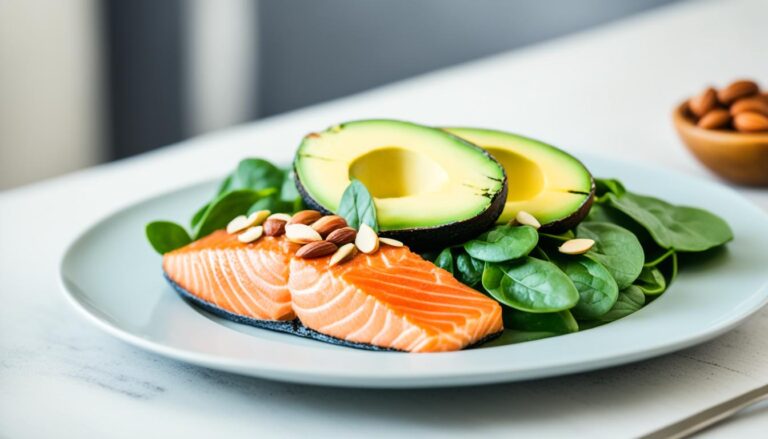Do you worry about every bite you eat? Think you’ve found the perfect diet? But, you might be harming your health with these extreme habits. Let’s look into how healthy eating can sometimes go wrong.
Key Takeaways
- Healthy eating can sometimes become an unhealthy obsession, leading to a condition called orthorexia.
- Extreme dietary restrictions can cause nutritional deficiencies and other health risks.
- Finding a balanced approach to nutrition, with moderation and variety, is the key to sustainable healthy eating.
- Cultivating a healthy relationship with food and a mindful eating habit can help avoid the pitfalls of food obsession.
- Listening to your body’s needs and making lifestyle changes for long-term wellness are essential for striking the right balance.
The Paradox of Healthy Eating
Trying to eat well can lead us to obsess over food. Focusing on healthy eating is good, but it can turn into a problem. This problem is called orthorexia nervosa.
When Being “Too Healthy” Becomes a Problem
Orthorexia means being too focused on the quality and purity of food. This focus can get in the way of a healthy relationship with food. It can hurt our physical and mental health. It’s ironic that trying to be healthy can sometimes make us eat too little or too much.
Recognizing the Signs of Orthorexia
- Obsessive thoughts and anxiety about the “healthiness” of food
- Rigid adherence to dietary rules and restrictions
- Significant distress or guilt when “unhealthy” foods are consumed
- Avoiding social situations to maintain dietary control
- Nutritional deficiencies due to the elimination of entire food groups
It’s important to find a balance in how we eat. By knowing the signs of orthorexia, we can eat well without being obsessed with food. This way, we get the good things from eating right without the harm of obsession.

Is Your Diet Too Healthy?
As someone who cares about health, it’s easy to overdo it with diet. Have you ever thought if your focus on nutrition and balanced diet is too much? The difference between a good diet and an unhealthy obsession with food is thin.
Wonder if your dietary restrictions are too strict? Ask yourself these questions:
- Do I constantly feel guilty or anxious about the food I eat?
- Have I cut out whole food groups, causing nutritional imbalance?
- Do I spend too much time planning, preparing, and thinking about every meal?
- Has my food obsession hurt my social life and relationships?
If you said “yes” to any of these, your diet might be too strict. Remember, moderation is key for a balanced diet.
“The healthiest diet is the one that you can sustain for the rest of your life.” – Unknown
By spotting signs of a bad food relationship, you can find a healthy balance. Enjoy the nutritional benefits of a good diet without the stress of food obsession.

The Pitfalls of Extreme Dietary Restrictions
I’ve always been into nutrition, and I get why some people follow strict diets. It seems like cutting out certain foods quickly leads to better health. But, the truth is, extreme diets can cause big problems.
They can lead to nutritional deficiencies and health risks.
Nutritional Deficiencies and Health Risks
Removing food groups from your diet can take away important vitamins and minerals. This can make you feel tired, weaken your immune system, and even harm your bones and organs. Dieting extremes can also mess with your hormones, cause stomach problems, and affect your mental health.
These health risks might not show up right away. By the time you notice them, it could be hard to fix the damage.
| Potential Nutritional Deficiencies | Associated Health Risks |
|---|---|
|
|
For a healthy diet, it’s important to eat a variety of foods. This way, you make sure your body gets all the nutrients it needs.
Finding the Sweet Spot: Moderation is Key
Finding a healthy diet is all about balance. It’s easy to chase “perfect” nutrition, but moderation is key for long-term health. A flexible approach helps us eat well without harming our life quality.
Too much focus on healthy eating can lead to orthorexia. This obsession with “pure” foods can cause nutritional issues, social problems, and a bad relationship with food. Moderation in eating helps avoid these issues and ensures a balanced diet.
To balance our eating, we need a new mindset. We should see food as something to enjoy, not a source of guilt. It’s okay to have our favorite treats sometimes, without feeling guilty.
- Choose a flexible, balanced nutrition approach instead of extreme choices.
- Pay attention to your body and listen to your hunger and fullness signals.
- Add a variety of nutritious foods to your meals, and let yourself enjoy treats now and then.
- Work on having a healthy relationship with food, not focusing too much on being perfect.
Striking the right balance between eating too little and too much lets us enjoy the benefits of a nutritious, balanced diet. It’s all about moderation and finding the right balance. This approach can change how we see food and our bodies.
“The secret to a healthy diet is not about eliminating foods, but rather finding the right balance and enjoying everything in moderation.”

Embracing a Balanced Approach to Nutrition
Getting a balanced diet is more than just watching what you eat. It’s about building a mindful relationship with food that feeds both your body and mind. By learning about mindful eating, you can make healthier choices that boost your well-being.
Exploring the Concept of Mindful Eating
Mindful eating means being fully present when you eat. It lets you enjoy the taste, feel, and smell of your food. This way, you listen to your body’s hunger and fullness signals, avoiding overeating.
Through mindful eating, you’re not just feeding your body. You’re also feeding your mind. By eating slowly and being aware, you learn to appreciate your food more. You also feel thankful for the food that feeds you.
- Savor each bite, taking the time to chew thoroughly and notice the flavors and textures.
- Eat without distractions, such as television or smartphones, to stay focused on the present moment.
- Check in with your body’s hunger and fullness signals, stopping when you feel satisfied rather uncomfortably full.
- Cultivate a sense of curiosity and wonder about the origins and preparation of your food.
By choosing a balanced nutrition approach and mindful eating, you can build a healthy relationship with food. This way, you nourish both your body and mind in a lasting and fulfilling way.

“The greatest weapon against stress is our ability to choose one thought over another.” – William James
Breaking Free from Food Obsession
If your diet has turned into an unhealthy obsession, it’s time to change. Breaking free and building a better relationship with food is key. It’s tough to overcome food anxiety and restrictive eating, but you can do it with the right strategies. You can learn to feed your body in a healthy, balanced way.
Cultivating a Healthy Relationship with Food
Changing how you think about food is a big step. See food as a way to nourish and enjoy yourself, not just something to eat. Adopt a mindful eating practice to enjoy each bite and listen to your body’s hunger signals.
- Try different nutritious foods to find new tastes and textures you like.
- Do regular physical activities for your health, not just to lose weight.
- Get help from a healthcare provider or nutritionist to create a balanced diet and a healthy food relationship.
Your value isn’t based on what you eat. Being kind and non-judgmental to yourself and your body helps you escape food obsession. This leads to a healthier, lasting way of eating.

“The secret of change is to focus all of your energy, not on fighting the old, but on building the new.” – Socrates
The Importance of Variety in Your Diet
Being passionate about a balanced diet shows how important variety is. Our bodies need a mix of nutrients, not just one type. By eating a variety of foods, we make sure we get all the vitamins and minerals we need.
Variety makes our diet more exciting and fun. Eating the same foods every day can get boring. But trying new foods is an adventure that makes eating enjoyable.
Also, eating a variety of foods helps us avoid nutritional shortages. These shortages can lead to health problems. By eating a wide range of foods, we make sure our diet supports our health fully.
| Food Group | Variety of Options |
|---|---|
| Fruits | Apples, bananas, berries, citrus fruits, tropical fruits, and more |
| Vegetables | Leafy greens, cruciferous vegetables, root vegetables, squash, and a rainbow of other options |
| Grains | Whole wheat, quinoa, brown rice, oats, barley, and a variety of whole grain choices |
| Proteins | Lean meats, poultry, fish, legumes, nuts, and seeds |
| Dairy | Milk, yogurt, cheese, and alternative dairy products |
By adding variety to our diets, we open up a world of healthy eating. Let’s start a food adventure and enjoy new tastes. This way, we nourish our bodies with all the nutrients they need.
“Variety is the spice of life, and it’s also the key to a healthy, balanced diet.”
Lifestyle Changes for Sustainable Healthy Eating
Getting a balanced diet is more than just what we eat. It’s also about our lifestyle. Let’s look at some easy changes we can make to help us eat healthier.
Meal planning is a big help. By planning our meals for the week, we can eat a variety of foods and avoid bad choices. Adding mindful eating, where we enjoy our food and pay attention to our hunger, helps us eat better for our bodies and minds.
Stress affects our eating habits. When stressed, we might eat too much or not enough. Doing things like yoga, meditation, or just taking short breaks can help us stay calm and focused on our health.
- Meal planning: Map out weekly meals for a diverse, balanced diet
- Mindful eating: Savor each bite and listen to your body’s needs
- Stress management: Incorporate stress-relieving activities into your daily routine
By changing our lifestyle in these ways, we can have a better relationship with food. We can keep eating healthy for a long time. Remember, being well is about balance, not being perfect.
| Lifestyle Change | Benefits |
|---|---|
| Meal Planning | Ensures a diverse, nutrient-rich diet; reduces unhealthy choices |
| Mindful Eating | Fosters a positive relationship with food; supports body’s signals |
| Stress Management | Prevents emotional or stress-driven eating; promotes overall wellbeing |
“Healthy eating is not about strict dietary limitations, staying unrealistically thin, or depriving yourself of the foods you love. Rather, it’s about feeling great, having more energy, and stabilizing your mood.”
Striking the Right Balance
Finding the right balance in our diet is tricky. We often swing between ultra-healthy eating and indulgence. The goal is to mix nourishing foods with treats for overall health.
Avoiding Dieting Extremes
Too much focus on nutrition can become unhealthy. A balanced diet is key, but obsessing over it harms our health. This obsession can turn into orthorexia, making us see food in a bad way.
It’s important to find a balance in our eating habits. Enjoy moderation and variety, and don’t feel bad about treats. Listen to your body and trust your instincts for a healthy diet.
“The secret of health for both mind and body is not to mourn for the past, nor to worry about the future, but to live the present moment wisely and earnestly.” – Buddha
By balancing healthy eating with enjoying life, we can have a good relationship with food. Balanced nutrition means finding a way that works for our bodies and souls, not striving for perfection.
Listening to Your Body’s Wisdom
I’m on a journey to eat healthier and focus on a balanced diet. I’ve moved past strict meal plans and counting calories. Now, I listen to my body’s signals to make better nutrition choices.
Building a good relationship with food is personal. It means understanding what my body needs. By eating slowly and noticing how I feel before, during, and after meals, I make better mindful eating habits.
- Tuning in to hunger cues: I now know the difference between true hunger and emotional eating. This helps me choose better foods.
- Honoring fullness signals: Listening to when I’m full helps me avoid eating too much. It keeps my diet healthy and balanced.
- Embracing food intuition: My body often tells me what it needs, like a salad or soup. I trust this inner wisdom.
Getting a healthy relationship with food isn’t always easy. But by staying present and open to my body’s messages, I find balance and satisfaction in my nutrition choices. This journey is ongoing, and I’m thankful for learning more about my body’s wisdom.
“The best diet is the one that makes you feel your best, with the least amount of restriction.” – Unknown
Conclusion
Reflecting on the quest for a “perfect” diet, I find it amusing. We often chase optimal nutrition but end up harming ourselves. Finding a balance is key, embracing moderation and a healthy food relationship.
This journey taught me that balance is crucial for healthy eating habits. By avoiding diet extremes, I can enjoy a balanced diet without bad habits. True health is about how we interact with food, not just what we eat.
Going forward, I’ll listen to my body and honor my cravings. I’ll focus on moderation and enjoy nourishing myself. The best diet is one that makes you feel good, energized, and in tune with your body and mind.





